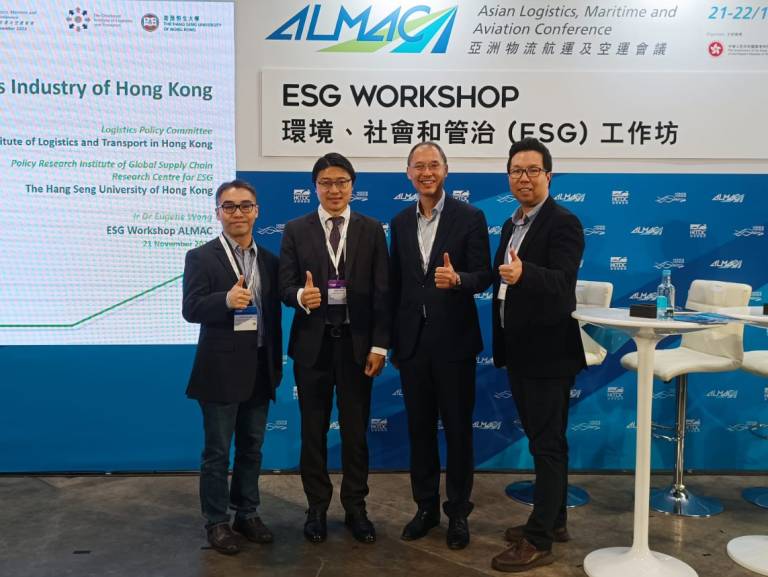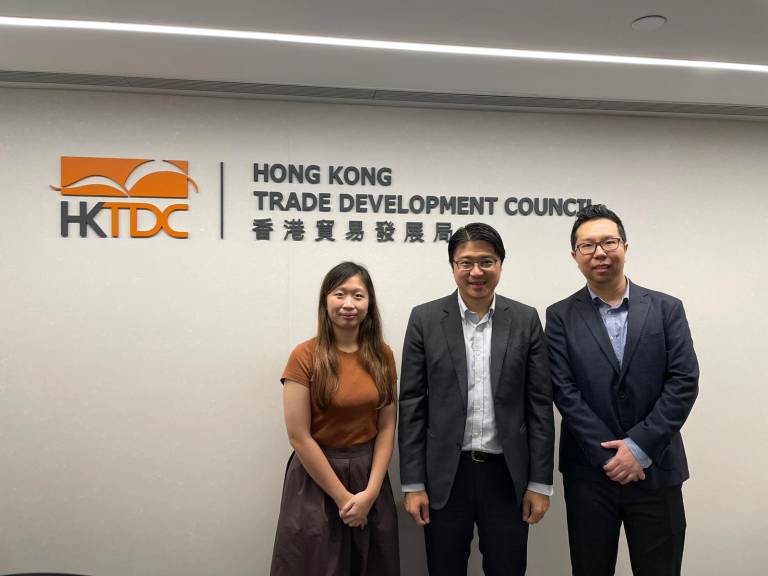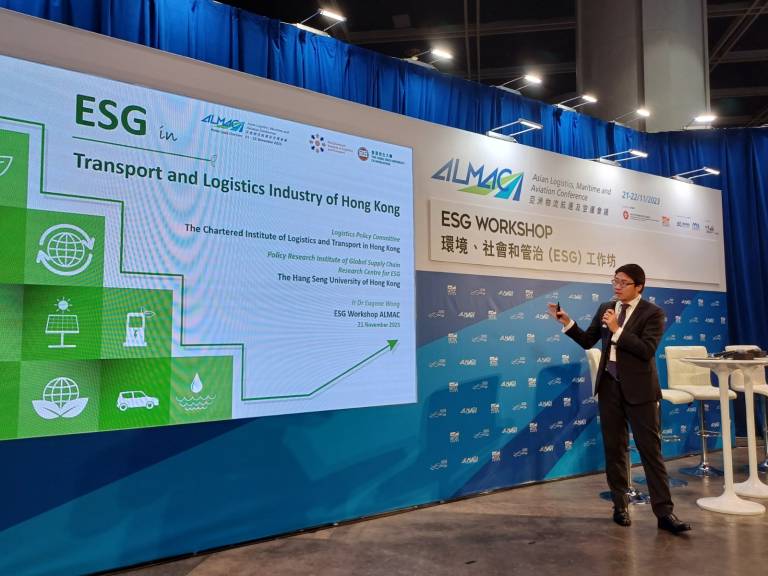Environmental, social and governance (ESG) has become a global crucial indicator of corporate social responsibility and long-term business value. Being an international logistics hub, ESG practice in Hong Kong's logistics and transport industry is critical for improving its competitiveness and sustainability. In collaboration with The Hang Seng University of Hong Kong (HSUHK)'s Policy Research Institute of Global Supply Chain, as well as its Research Centre for ESG, Logistics Policy Committee of The Chartered Institute of Logistics and Transport in Hong Kong (LPC of CILTHK) conducted a research survey to explore the current ESG situation, challenges and developments of the industry.
Between March and December 2023, the research team collected over 200 questionnaires covering many aspects of the industry. Respondents include members of CILTHK, industry managers, practitioners and scholars among others. Approximately a quarter of the respondents were freight forwarders, while companies with over 50 employees accounted for three-fourths of all respondents. The team found that respondents are facing increasing pressure to comply with ESG requirements from customers, shareholders, suppliers, employees, and the larger community. Additionally, over half of the respondents realised that fulfilling the ESG requirements would be conducive to their businesses, giving them higher competitiveness for more business opportunities, lower interest rates through sustainability-linked loans, an improved corporate image, as well as lowered operating risks and costs.
According to the survey, 49%, 67%, and 70% of the respondents' companies have existing measures to tackle environmental, social, and corporate governance related issues in their internal operations or services for clients, respectively. 56% indicated that their environmental practices mainly focus on promoting ESG policies, establishing ESG objectives and standards, exploring ESG opportunities, and managing risks. The survey also revealed that 49% of respondents express a negative or uncertain attitude regarding further promoting environmental practices in-house or in services offered to their clients, and 43% expressed uncertainty or unpreparedness to communicate and push related policies through their value chain and stakeholders. Most respondents stated that they need support with accessing industry benchmarks, as well as clear ESG guidelines, financial support from the government for starting ESG projects, and industry reference cases.
81% of respondents expressed uncertainty regarding the current ESG-related funding provided by the Hong Kong Government. Over 90% of respondents agree that if the authorities strengthen their incentives or subsidies for ESG, their companies are willing to fulfil specific requirements to further implement ESG practices. The research team also found that large companies with over 50 employees place more emphasis and commitment towards sustainable sourcing, carbon and greenhouse gas reduction, quality and safety of products and services, diversity, equity and inclusion, and fair labour codes when compared to small and medium enterprises (SMEs). The results indicate that SMEs need more support and education to promote and implement ESG practices.
The research team made the following suggestions on raising awareness and increasing support for ESG practitioners:
- Publicity and education: The Hong Kong Government should increase publicity efforts on ESG projects including initiatives such as the Professional Training on Smart and Green Logistics Scheme, the Pilot Green and Sustainable Finance Capacity Building Support Scheme, and the New Energy Transport Fund.
- Industry support: Authorities should consider supporting SMEs' participation across ESG projects, especially green projects. Authorities can also study the feasibility of providing different levels of support for enterprises that have reached certain requirements with ESG implementation at the time of application.
- Guidelines and reference cases: The Hong Kong Government and relevant industries should work together to develop clear guidelines on ESG practices and provide successful cases for reference.
- Business ESG progress: When applying for governmental support, enterprises should ensure that their ESG-related implantation has met minimum requirements.
- Industry collaboration: Enterprises and trade associations should strengthen cooperation to ensure that they provide comprehensive and up-to-date progress reports on ESG implementation in the industry.
- Technical support and cooperation: Support and collaboration platforms should be made available by the government to promote sustainable projects, provide technical support, and facilitate the sharing of best ESG practices.
- Promoting success: Successful ESG practices should be shared in the industry to encourage more participation.
The research team also analysed overseas case projects regarding the conversion of brownfields or green lands to logistics land. These case studies can provide Hong Kong with an insight into the development of sustainable logistics land. The study includes several projects in Leicestershire and Wigan in the UK, in which green land that was successfully turned into logistics parks attracted the stationing of large logistics companies such as DHL and Amazon. Such initiatives create jobs in neighbouring districts and also set carbon-neutral requirements such as meeting environmental assessment requirements in the building standards of the Building Environmental Assessment Method (BEAM) Plus, Leadership in Energy and Environmental Design (LEED), installing solar panels on top of warehouses, or using new energy-efficient vehicles and equipment in logistics parks for logistics enterprises.
The Hong Kong Government has revealed that Hong Kong has over 16,700 hectares of green land; however the confirmed area that is developable constitutes only a small portion of the available land. The research team suggests further studies can be conducted to explore the possibility of increasing land use for sustainable logistics, and that the government can refer to local and overseas success cases and further explore sustainable ways to develop modern and green intelligent logistics parks in the Northern Metropolis and Hung Shui Kiu New Development Area in the future.




